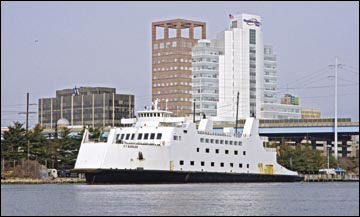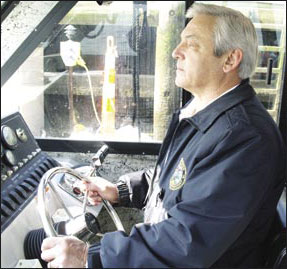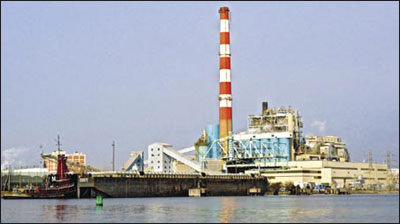Bridgeport Harbor Closes Security Gaps with Grants
| By FRANK SZIVOS, Correspondent |
After 9/11, Joseph Riccio, executive director of the Bridgeport Port Authority (BPA), realized even more than ever that the Bridgeport Harbor was a vital link between New York City and Long Island and the rest of New England.
He recalls 9/11 vividly when I-95 was nearly empty, no planes were in the sky, and trains had stopped running or were on limited schedules. The exception that day was the ferry steaming into the Bridgeport Harbor, which was still open and running. It was the only link between New York and Connecticut and one of the limited options to leave Manhattan. Even the U.S. Coast Guard allowed foreign-flag vessels to dock in Bridgeport on 9/11, and cruise ships requested to offload passengers who were stranded at sea with no other ports open to them.
 Since then, the BPA, a quasi-public entity that has jurisdiction over the entire Bridgeport Harbor, has taken significant steps to beef up this vital water link, applying for Homeland Security grants. In three rounds of federal funding beginning in 2003, the BPA has received about $5 million to improve harbor area security.
Since then, the BPA, a quasi-public entity that has jurisdiction over the entire Bridgeport Harbor, has taken significant steps to beef up this vital water link, applying for Homeland Security grants. In three rounds of federal funding beginning in 2003, the BPA has received about $5 million to improve harbor area security.
The result today is Bridgeport Harbor has become a highly secured port, featuring the latest high-tech security equipment and a greatly reduced vulnerability to terrorist attacks. As Riccio pointed out, the BPA owed it to the region and the more than one million people who annually travel the Bridgeport & Port Jefferson Steamboat Company ferry that lands at the Water Street dock located at the waterfront.
“Bridgeport Harbor is a vital and active port,” Riccio said. “Between the commercial boats coming in here and the ferry passengers, we need to make our harbor as secure as possible. We’ve been fortunate to receive Homeland Security grants that have allowed us to create as safe an area as possible.”
 It’s a big job protecting the Bridgeport Harbor area that stretches for a couple of miles and includes several businesses, such as Derecktor Shipyard, Coastline Terminal for general cargo, lobster and oyster fishing companies, several private marinas, the Fairfield University Rowing Club, and the PS&G power plant.
It’s a big job protecting the Bridgeport Harbor area that stretches for a couple of miles and includes several businesses, such as Derecktor Shipyard, Coastline Terminal for general cargo, lobster and oyster fishing companies, several private marinas, the Fairfield University Rowing Club, and the PS&G power plant.
What’s more, ships and barges hauling coal and gasoline and oil tankers use the harbor waters. Approximately five million tons of cargo are shipped into the harbor annually. Derecktor Shipyard, one of the premier builders of private yachts and high-speed ferries, also generates a great deal of maritime traffic in the harbor.
In Riccio’s opinion, BPA has spent the grant money wisely on state-of-the-art security equipment and software, which has also allowed it to put more stringent security measures and procedures in place. Some of those security improvements are:
- A second high-speed police boat, operated by the Bridgeport Police Department Marine Unit, is capable of speeds up to 50 miles per hour. The patrol boat is fully equipped with security and communication devices for patrolling the harbor and Long Island Sound;
- A command center of monitors based at the ferry terminal and headquarters of the BPA, to survey the harbor area;
- High-intensity lighting and fencing around the ferry terminal;
- Sophisticated sonar equipment for monitoring the harbor bottom as well as the submerged hulls of tankers docking in the harbor;
- Explosive-detecting devices to scan vehicles using the ferry as well as portable barriers to contain vehicles.
“Our security system is so sensitive, it can detect the difference between an intruder and the wind blowing,” Riccio said. “This allows us to make the entire maritime complex safe from any security threats.”
U.S. Representative Christopher Shays of Connecticut, a member of the Homeland Security Committee who represents the Fourth Congressional District, which encompasses Bridgeport Harbor, has played a major role in helping to procure Homeland Security grants for the BPA. He places port security as a high priority for Connecticut.
“Our waterways are crucial to the economy in our region, so we need to take every step we can to keep them secure. The federal funding received has helped the Bridgeport Port Authority improve their surveillance and detection capabilities to help keep the port safe,” Shays said.
 Bridgeport Harbormaster Joseph Savino, who works along with the Bridgeport Police Department Marine Unit to keep the harbor area secure, says it is a demanding job but he is relieved to have the state-of-the-art security equipment to keep a vigilant eye on the harbor.
Bridgeport Harbormaster Joseph Savino, who works along with the Bridgeport Police Department Marine Unit to keep the harbor area secure, says it is a demanding job but he is relieved to have the state-of-the-art security equipment to keep a vigilant eye on the harbor.
“We're happy to have all the security equipment that we can,” Savino said. “This is a busy port area. We also assist the Customs Department and the Coast Guard with patrolling and helping stranded boaters. Our new boat is already paying for itself.”
Fortunately, there have been no terrorist attacks, but Savino, a retired Bridgeport police officer, and the Bridgeport Police Marine Unit have responded to several distress calls with the new 24-foot Boston Whaler. Savino recalls that the special dive door in the bottom of the boat allowed the police to rescue two windsurfers, who were in distress and floating out to sea. Because one windsurfer had a severe shoulder injury, the police were able to maneuver him onto the boat through the dive door.
“We're still in training with a lot of our equipment,” Savino said. “But we can see how the sonar equipment gives us a much better understanding of what the bottom of the harbor is really like. We plan to conduct a study that will map out the exact depth of the entire harbor.”
While the BPA has installed state-of-the-art equipment with its federal funding, there is always more that can be done. Riccio is aware that security is a relative term, and no place is impervious to a sophisticated terrorist attack. The BPA plans to continue to apply for additional federal grants in the future to keep pace with the latest equipment improvements and to accommodate the changing face of the waterfront.
The BPA views the harbor as an alternative transportation mode to the highway and trains with a tremendous potential to grow in the future. To keep the port thriving as an important economic development tool for the Fairfield County region demands that it be secure.
“We've installed the best equipment to create as secure an environment as possible,” Riccio said. “It's been money well spent that closes any gaps in our security and makes us significantly less vulnerable to terrorists' attack or natural disaster. Our port is in a key strategic area. We're taking the necessary steps now to make our future more secure.”
Contact the author at f.szivos@thejusticejournal.com
|






